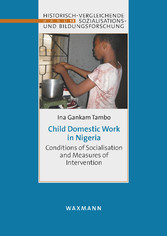Suchen und Finden
Service
Mehr zum Inhalt

Child Domestic Work in Nigeria - Conditions of Socialisation and Measures of Intervention
book cover
1
Preface
5
Acknowledgements
7
Table of Contents
9
Introduction
15
Child Domestic Work as Study Subject
15
Motivation
17
Structure of the Study
19
1 Child Domestic Work as Subject of Research and Intervention
22
1.1 Understanding “Domestic Work”
22
1.2 A Historical and Regional Overview of Child Domestic Work
24
1.2.1 Modern Age Child Domestic Work in Europe and North America. Reasons and Types of Child Domestic Work in the 16th to 19th Centuries
24
1.2.2 Current International Debates on Child Domestic Work
31
1.3 Legal Regulations of Child Domestic Work in the Western World
49
1.3.1 The Concept of Childhood in the 15th to the 19th Century
49
1.3.2 Legal Acts Concerning Child Domestic Workfrom the 15th to the 19th Century
51
1.4 Approach of this Study
55
1.4.1 Research Gaps in the Literature
55
1.4.2 Child Domestic Work in Comparative Education
56
1.5 Theoretical Framework
58
1.5.1 Cultural Hybridity
58
1.5.2 Socialisation
64
1.5.3 World Polity Theory
74
1.6 Research Questions of the Study
78
2 Methodology
79
2.1 Field Research in Nigeria
79
2.1.1 The Stakeholder Sample
80
2.1.2 Interviews
82
2.2 Methodological Approach to the Data Analysis
87
2.2.1 Qualitative Content Analysis
88
2.2.2 Process of Data Analysis
89
2.3 Quality Criteria of the Research
94
2.4 Reflections on the Dynamics of Cross-Cultural Research
98
3 Historical Developments of Parenting and Education in Nigeria
102
3.1 Methodological Approach
102
3.2 Nigeria Before and After Independence
104
3.2.1 Nigeria until 1960
104
3.2.2 Post-Colonial Developments in Nigeria
106
3.2.3 Nigeria Today
111
3.3 Changes in Nigeria’s Social Security Systems
113
3.3.1 Defining Social Security and Social Protection
113
3.3.2 Social Security Systems in Nigeria before and during Colonial Rule
115
3.3.3 Present Social Security Systems in Nigeria
118
3.4 Changes in Nigerian Patterns of Parenting and Education
126
3.4.1 Influences on Pre-Colonial Nigerian Parenting Systems
126
3.4.2 Introduction of Western Formal Education
132
3.4.3 Child Work and Child Domestic Work in Nigeria
136
3.5 Conclusion: Child Domestic Work in Nigeria’s Hybrid Society
148
3.5.1 Postcolonial Emergence of Nigeria’s Hybrid Society
148
3.5.2 Ambivalent Effects of Nigeria’s Hybrid Culture on Indigenous Patterns of Parenting
150
4 Child Domestic Workers’ Conditions of Socialisation
153
4.1 Methodological Approach of Data Evaluation
153
4.1.1 The Child Domestic Workers Sample
154
4.1.2 Analysis of the Interviews with Child Domestic Workers
156
4.2 Motivations for Child Rural-Urban Migration
163
4.2.1 Pull-Factors for Migration from a Child’s Perspective
163
4.2.2 Reasons of Parents to Send out Children
172
4.2.3 Reasons of Employers to Employ Children
175
4.2.4 Reasons of the Intermediary to Place Children
180
4.3 The Children’s Perception of Working and Living Conditions
186
4.3.1 Working and Living Conditions according to the 12 Rights of Working Children and Youth
186
4.3.2 Perception of Child Domestic Workers’ Working and Living Conditions with Regard to Kinship
201
4.3.3 Child Domestic Workers’ Working and Living Conditions with Regard to Gender
210
4.4 Child Domestic Workers’ Working and Living Conditions from the Perspective of Employers and their Children
212
4.4.1 Conditions of Socialisation from the Perspective of Employers
212
4.4.2 Conditions of Socialisation from the Perspective of the Employers’ Own Children
229
4.5 Child Domestic Workers’ Coping Strategies when Faced with Aversive Working and Living Conditions
239
4.5.1 Coping Strategies of Children
240
4.5.2 Child Domestic Workers’ Coping Strategies
242
4.6 Conclusion: The Impact of Child Domestic Work on Conditions of Socialisation
255
4.6.1 Child Domestic Work in Nigeria’s Hybrid Society – The Macro-Social Level
256
4.6.2 The Intersecting Discriminating Effects of Child Domestic Work – The Interaction and Action Level
257
4.6.3 The Status of Well-Being of Child Domestic Workers – The Individual Level
262
5 Measures of Interventionin Child Domestic Work in Nigeria
265
5.1 Methodological Approach to the Analysis of Interventional Measures on Child Domestic Work in Nigeria
265
5.1.1 Definition of Political and Pedagogical Measures of Intervention
265
5.1.2 The World Polity Theory and the Implementation of Political and Pedagogical Interventional Measures
266
5.1.3 Data Evaluation Regarding Political and Pedagogical Interventional Measures on Child Domestic Work in Nigeria
267
5.2 Current International Legal Regulation of Child Work and Child Domestic Work
272
5.2.1 International Legal Regulation of Child Domestic Work
273
5.2.2 Examples for Practical Responses to Child Domestic Work from an International Perspective
277
5.3 Implemented Political and Pedagogical Measures of Intervention in Child Domestic Work in Nigeria. Results from the Field Study
279
5.3.1 Political Interventional Measures on Child Domestic Work
279
5.3.2 Political Measures of Intervention on Child Domestic Work on the Meso-Social Level
290
5.3.3 Pedagogical Interventional Measures on Child Domestic Work
299
5.3.4 International Standards of Human Rights Education on Pedagogical Measures of Intervention
314
5.4 Conclusion: Interventional Measures on Child Domestic Work in Nigeria’s Hybrid Society
320
5.4.1 Ambivalent Effects of Nigeria’s Hybrid Culture on Interventional Measures on Child Domestic Work. A Macro- and Meso-Social Perspective
320
5.4.2 Correspondence of Interventional Measures with Child Domestic Workers’ Conditions of Socialisation. A Micro-Social Perspective
324
5.4.3 Social Transformation through Subject-Oriented Implementation of Global Child-Related Policies
329
6 Summary and Outlook
331
6.1 Summary of Main Results
331
6.2 Discussion of the Theoretical Perspectives Applied to Child Domestic Work
334
6.2.1 The Relevance of Postcolonial Research on Child Domestic Work and for Comparative Education
335
6.2.2 The Impact of the Capabilities Approach for the Research on Child Domestic Work and for Comparative Education
337
6.2.3 Theoretical Relevance of the World Polity Theory for Research on Child Domestic Work and for Comparative Education
338
6.3 Perspectives for Further Research and Action
339
Annex
342
References
352
Alle Preise verstehen sich inklusive der gesetzlichen MwSt.








